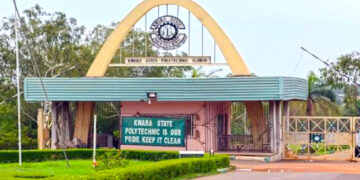The postmodern condition poses numerous existential problems. Besides perpetual fear, Nigerians are entangled in penury and squalor. On the one hand, these perilous and perishing conditions tend to compel the avaricious, the covetous, the paupers and the dispossessed into criminal enterprises such as stealing, kidnapping, thuggery, armed robbery, investment fraud and contract killing. On the other hand, inordinate greed for material accumulation motivates the dominant and the ruling class to embark on the act of embezzlement of public funds meant for the well-being of the whole society. Against this backcloth, contemporary Nigerian literary texts, especially prose-fictions explore the manner in which the current realities become serious issues of concern. This proves the claim of Eagleton (1976) that literary text is a reflection of social, political and historical contexts in which it is produced. Like other contemporary Nigerian novelists, Sumaila Isah Umaisha’s Glasshouse (2022) portrays how corruption, terrorism, insurgency and kidnapping have become a social pandemic in his country.
Glasshouse portrays that though corruption is one of the major causes of widespread and chronic poverty in Nigeria, it is hardly punished. On several occasions, corruption is either celebrated or even rewarded. The consistently gossiped and feared stranger presumed to be harboured at the ‘Glasshouse’ in Major Farms later revealed to be Ahmed is one of the ‘five individuals involved in economic crimes.’ (p. 62). They have been on the run ever since they were declared wanted. While some of these economic and financial criminals got an early opportunity to flee the country for the USA, others got arrested.
Through Alhaji Saleh, his trusted friend and close business associate, Ahmed negotiated with the authorities, and he was simply asked to return thirty billion out of his ill-gotten wealth to the federal account. Having done that, he is now free and regarded as a gentle Nigerian, maintaining full control over his investments, including Major Farms. This exposes the government’s arrests and detentions as sheer mockery. Pronouncements such as commitment ‘to punish all the corrupt elements in the country’ (p. 161) appear to be empty and deceptive, aimed at misleading the public.
Umaisha depicts some of the establishments aimed at fighting corruption as failed agents of the political institution, but then the government itself has failed – it has failed to do its basic function of securing the lives and property of her citizens. As portrayed in the novel, peace, stability and optimism have since died off. Violence, chaos and pessimism have taken firm control of the polity. Contract killing, kidnapping, insurgency and terrorism have become the most lucrative business enterprises in the country.
The sudden kidnap and subsequent murder of Mr. Bulus heightens the level of fear and apprehension in Major Farms and neighbouring communities. In the face of this tragic experience, the novel depicts the police as a failed state apparatus of peace and security. Despite years of training as professional law enforcement agents, the police have become another source of fear and panic for innocent citizens. They are depicted as more dangerous than kidnappers.
While Mr. Bulus is still in the kidnappers’ captivity, his family and colleagues are expecting an intensified effort to rescue him. Unfortunately, the police only embark on regular intimidating visits to Major Farms. At the end of it all, Mr. Bulus is found murdered.
Umaisha aptly and radically depicts Nigeria as something of a ‘Banana Republic’. Insurgency and terrorism have prevailed in the country for years despite the plentitude of military and police forces.
It sounds paradoxical and rather appalling that General Danbaba, being an elite element, is only sacked from his ministerial position after it has been confirmed that he is linked to banditry. He continues his normal life while the criminals still kill innocent people. Amid heightened insecurity due to Boko Haram’s regular attacks, a selected elite scrambled on some funds earmarked for the purchase of military hardware. This heinous act of corruption happens at a time when the government is making threats of merciless action against the perpetrators of corruption.
The novel goes deeper into the sociological anus of contemporary Nigeria thereby exposing the way in which greed for power and money triggers some Nigerians to engage in the act of religious manipulation. This is done through magic or charm, a kind of spiritual instrument of securing money and power.
Garba, the store officer of Major Farms is desperate for a higher rank, and so Habu introduces him to a powerful marabout, Malam Gobe. It is believed that he has the spiritual capacity to work against all natural odds that tend to prevent one’s social progress. Not yet acquainted with the system, Garba anticipated some sort of scriptural recitation or act of charity towards achieving his dream. But the Malam makes it clear to him that he cannot easily get what he wants by following the normal religious path.
Optimism for an ideal society
In spite of all the social, economic, political and religious malaise and maladies, Nigeria is not a hopeless society. Umaisha is optimistic that one day Nigerians will live in an ideal society such as the one he has created in the novel. In this society, diversity becomes a source of pride, blessing and strength. People of different cultural backgrounds sit around one table to dine and wine, devoid of any form of demonization. The people work together and have an equal chance of prosperity, as merit works rather than nepotism.
Major Farms provides a good example of such a system. On the farm owned by a Hausa-Fulani Muslim, Mr. Bulus, a Christian from the minority tribe of Kaduna State, until his unfortunate death, had been the Managing Director of the company. Mr. Godwin Obiora, an Igbo Christian, who was the General Manager, now replaces Mr. Bulus.
In Umaisha’s utopian society, social status is not in any way a barrier: the children of the poor freely interact with the children of the rich, and intermarriage between them is a great possibility. The novel depicts a serious, warm and true love relationship between Femi, a Yoruba corps member from a poor family, and Aisha, the daughter of Ahmed (owner of Major Farms) where the former is doing his service. While the two lovers are nursing the hope of marrying any time soon, Aisha takes the chairmanship office of Major Farms. Hence, Femi is now incomparably a big boy in Major Farms.
Still in this ideal society of human family, Muslim and Christian communities exist peacefully and harmoniously side-by-side. On the occasion of Mr. Bulus’s funeral which attracted a huge gathering, Muslims decide to relinquish a large portion of their mosque vicinity for the funeral ceremony, even though the occasion coincides with Friday prayer.
It is obvious that Glasshouse represents a good sample of a postmodern African novel – the kind of literary material we need in contemporary Nigeria. In this novel, Umaisha upholds the literary projects of famous postcolonial African writers such as Chinua Achebe, Wole Soyinka, Ayi Kwei Armah, Ngugi Wa Thiongo, Mongo Beti, John Eppel, Athol Fugard, Nadine Gordimer, Buchi Emechata, Amina Shaw and Ousmane Sembene. Thus, it is not out of place if publishing companies decide to reject any literary text which fails to follow the trend of Glasshouse. A serious government may wish to make reading this novel and its kind compulsory at all levels of education.
Nasir Hashim is of the Department of English and Drama, Kaduna State University, Kaduna.
([email protected]. 08135295865)
We’ve got the edge. Get real-time reports, breaking scoops, and exclusive angles delivered straight to your phone. Don’t settle for stale news. Join LEADERSHIP NEWS on WhatsApp for 24/7 updates →
Join Our WhatsApp Channel










